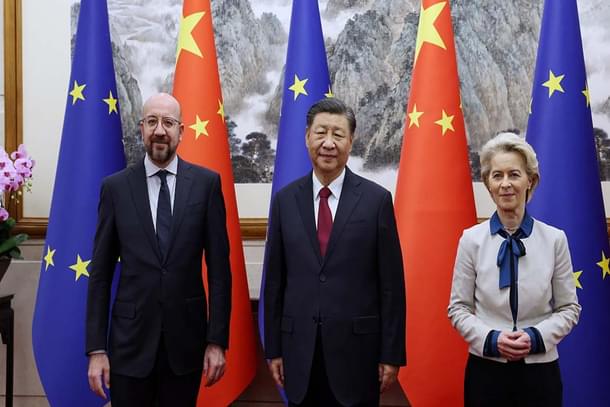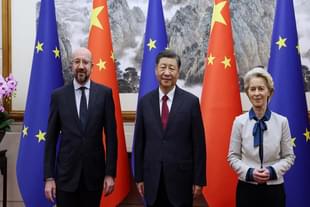Commentary
Explained: Why A Chinese Security Equipment Supplier Was Raided In Europe
Amit Mishra
Apr 26, 2024, 11:41 AM | Updated 11:41 AM IST
Save & read from anywhere!
Bookmark stories for easy access on any device or the Swarajya app.


Tuesday (25 April) saw a new drama unfold as EU investigators raided the Warsaw and Rotterdam offices of Nuctech, the Chinese supplier of security equipment, citing breach of foreign subsidy rules.
The European Commission is accusing Nuctech of receiving "distortive foreign subsidies" from Beijing, leading to industrial overcapacity that might inundate Europe with low-cost Chinese imports.
While the commission did not name Nuctech in its statement about “unannounced inspections”, it said that there were “indications that the company may have received foreign subsidies that could distort the internal market pursuant to the Foreign Subsidies Regulation”.
Established in 1997 as an offshoot of China's prestigious Tsinghua University, Nuctech is currently under the ownership of Tsinghua Tongfang. Tsinghua Tongfang, in turn, is partly owned by China National Nuclear Corporation, a state-owned organisation whose management is directly appointed by the Chinese Premier.
Nuctech specialises in producing large security scanners for shipping containers and railway cars, as well as luggage scanners and metal detectors for airports
The company’s products are ubiquitous across Europe, serving EU's two biggest container ports — Rotterdam and Antwerp, airports in Stockholm and Pisa, and Brussels' Eurostar terminal.
According to an FT analysis of the commission's documents, governments in Europe awarded more than 160 contracts to Nuctech amounting to more than €120 million over the past 10 years.
Interestingly, the commission has also signed off on spending funds from the Customs Control Equipment Instrument, which has a budget exceeding €1 billion to assist member states in upgrading their equipment.
Put simply, Nuctech's growth in European markets reflects a common strategy of Chinese companies "buying into infrastructure" with state support.
In fact, the issue of Chinese companies unfairly benefiting from subsidies from Beijing at the expense of European rivals has sparked political outcry since at least 2009.
In 2009, the commission imposed provisional anti-dumping duties on Nuctech after rivals accused the company of consistently undercutting them on price through government subsidies.
Apart from the economics at play, Nuctech has been triggering security concerns. The US has raised concerns about national security risks, leading to Nuctech being blacklisted by the US Bureau of Industry and Security in 2020.
In 2022, three members of the European Parliament criticised Strasbourg airport's deal to buy baggage-scanning gear from Nuctech. They wrote to the French state representative for the Strasbourg region, urging the contract to be cancelled "until an independent investigation" confirms that Nuctech's tech doesn't pose spying risks.
Strasbourg, being the official seat of the European Parliament, the Council of Europe, and the European Court of Human Rights, adds significance to these concerns.
Tuesday's raids as dramatic as it gets, represents a final effort to tackle what's seen as one of the biggest threats to the Eurozone economy: foreign subsidies from Beijing.
Consider this: Since introducing its foreign subsidies regulation in July 2023, the European Commission has launched four investigations into Chinese companies. These include European subsidiaries of solar power giants Longi and Shanghai Electric, as well as CRRC Corporation Limited, the state-owned rolling stock company.
At the same time this shows a strategic shift towards scrutinising foreign companies perceived as security threats by targeting on their trade practices used to establish a presence in the EU market.
Despite Nuctech denying the allegations, the raids have sparked a strong reaction from China's commerce ministry, labelling them as "protectionist” acts that “violated the principle of due process”.
For now, while the raids may complicate the already strained EU-China trade relationship, the true impact will become evident once the investigations are concluded.
At best, it could result in an unofficial ban on certain Chinese companies in specific sectors. At worst, it would compel Chinese firms to compete on an equal footing with their European counterparts, a challenge many may not be prepared for.
One thing is obvious: China won't just close down and stop operating. Whatever move China makes next could shape the next phase of global trade wars.





